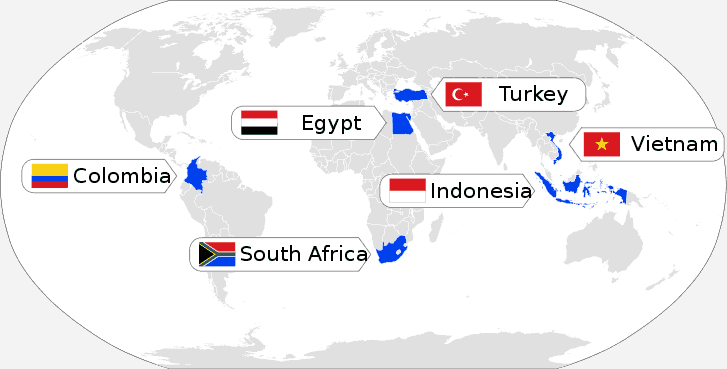Highlights from International Search Summit 2011
This blog focuses on key take away messages and best practices recommended at International Search Summit 2011 (ISS.) This event was held in conjunction with Search Marketing Expo 2011 (SMX) in Seattle earlier this month; our own Peter Betts attended both events and covered SMX in the previous blog, “Highlights from Search Marketing Expo (SMX) 2011.”
“CIVETS”, Baidu and Yandex were just a few of the market opportunities and search engines covered at ISS. This conference workshop had a number of presenters with varying backgrounds who shared metrics and experiences with global SEO. Updated statistics reveal which search engines are strongest in several strategic offshore markets and recommended best practices for global SEO were shared.
CIVETS vs. BRIC
Discussions around key emerging markets focused on CIVETS, (Columbia, Indonesia, Vietnam, Egypt, Turkey and South Africa.) This term was coined a couple of years ago by a director at the Economist Intelligence Unit (EIU) who felt that these countries are prone to dramatic growth due to diverse economies and growing, young populations.

BRIC (Brazil, Russia, India and China) represent very strong international markets. But the moderator felt that BRIC has already “emerged” and now represents stable, growing economies. (Note: for more information on BRIC, view our previous blogs on Brazil, Russia India and China.)
Key points for International Search
Have great research and planning.
Example: FORD had forecast that $15K was the price that the market would bear in India; they designed and sold cars there with roll-down windows in the front, but not in the back. At the time of this venture, people in India who could afford a $15K car had drivers or chauffeurs. The unfortunate consequence was that up-scale consumers would have had to ride in the “hot” part of the car with no ventilation! This illustrates an example of a western company not researching key metrics and issues in a foreign market.
Abusing keywords
Keep your content to one language per web page. If you try to have multiple languages on a single web, it is very challenging for search engines to recognize keywords. In cases with multiple languages per page, translation issues arise with keyword plurals, prepositions, accents, alternative spellings, broken compounds, inflection, etc.
Have a content strategy
- Map keywords to pages.
- Use keywords to drive and frame content.
- Creative copywriting is not the answer.
Smart geo-selector needed
Users need an easily identifiable way to select their own language when visiting your website.
Beyond Google: other search engines
Yandex in Russia
Yandex is a leading Russian search engine and web company with many facets. It is actually the leading method for online payments in Russia, as credit cards are not popular with residents there. Yandex has 65% of the search market in Russia and is the #1 Internet destination there. Yandex also has 58% of the online ad market in Russia, and had $440 million in revenues in 2010.
Yandex also offers free translation services to companies that want to run ads with them. They use machine translation for this. They do not use an algorithm for keyword search, but rather machine learning after human input.
Baidu in China

- Baidu has 80% of China’s search market.
- The <title> tag is the most important. More important than <h1> or <h2> tags.
- Keywords definitely need to be on the web page; it will be downgraded if they are not present.
- Good links count will help with search results.
- It is very important to have text near the top of the webpage, as Baidu will only crawl through the first 150 characters. Note: in the Chinese writing system each “character” is generally a morpheme or “word” in Simplified Chinese.
- Site maps are very important.
- Ads with dynamic content get a better quality score.
- In China, ‘Union Pay’ credit cards are the customary forms of payment online for shopping.
- Page load time is a key factor towards good results on Baidu.
- The next market for Baidu is possibly Japan.
Naver in South Korea
- Naver has 69% of the search market in South Korea.
- South Korean search engine marketing is nearly all pay per click (PPC.)
- PPC is typically very inexpensive in that market.
- An organic search focus is not needed.

Domain – local vs. dot com
There is no clear answer to this issue yet. In general, local domains are better as they build trust and help achieve better search rankings.
Local hosting may not always be the key issue. In tests, locally hosted sites were top-ranked with local search engines, but each of the top-ranked sites in the test had other key criteria that may have made them rank high. Each of these sites had inbound links. Xerox is rolling out local domains everywhere.
Miscellaneous global search engine issues
- Yahoo is largest search engine in Taiwan.
- Foreign search engines have criteria that are fairly easy to meet. They have limited resources. If you meet the needs for Google you are in good shape to meet the needs for most global search engines.
- Links – only a few links are needed. One company was able to link to their own “other” sites to achieve good results with global search engines.
- Authority is important. You can link your website with partners, which will improve SERPs.
- Style guide – get it created early on and signed off for global use.
- Numbers are popular in China for web addresses due to keyboard limitations. Numbers are input as a single keystroke, whereas Chinese characters require multiple keystrokes.
